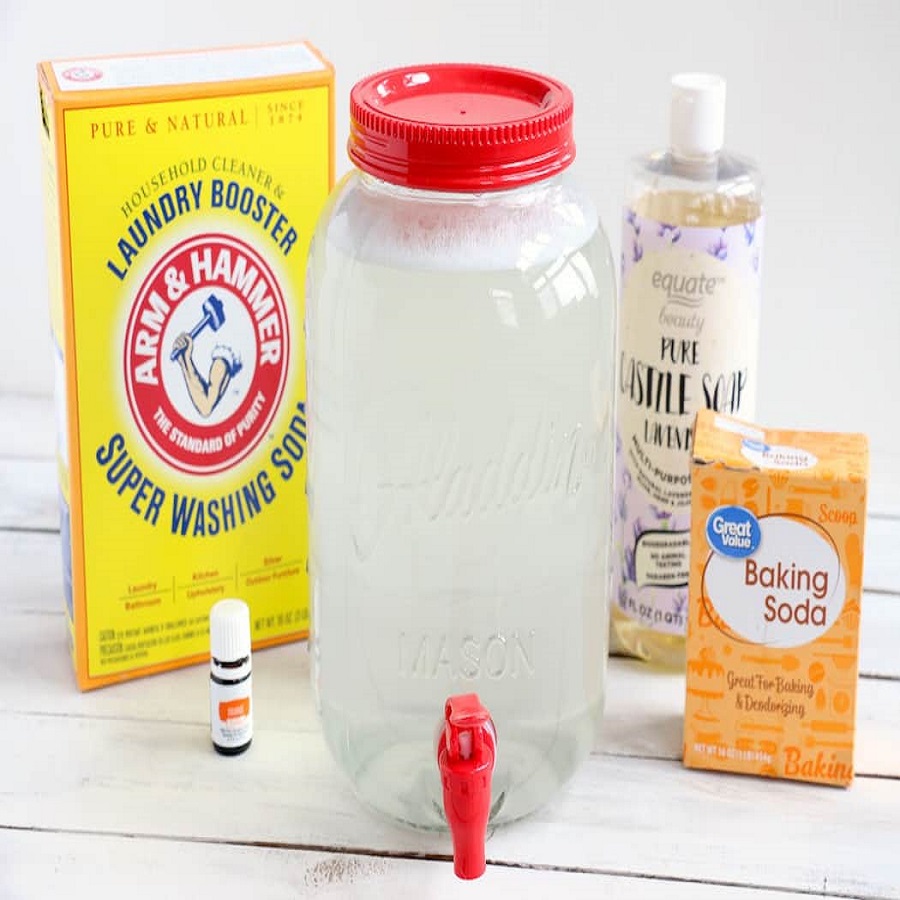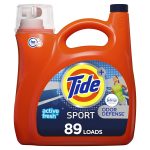Introduction to Homemade Laundry Detergent
Making your own laundry detergent is not only eco-friendly but also budget-friendly. It avoids the use of harsh chemicals found in commercial detergents. This practice aligns with a sustainable living lifestyle. Through this guide, you will learn how simple it is to create an effective detergent at home using just a few readily available ingredients. Homemade laundry detergents can be just as effective as store-bought ones, if not more so, especially for sensitive skin. They provide great cleaning power without the harmful effects of synthetic chemicals, making them a safer choice for your household.
The process of making laundry detergent at home is quite straightforward. You can control the quality and type of ingredients used, ensuring that they are safe for your family and the environment. It is an excellent opportunity to experiment with natural ingredients that are less harmful to your skin and clothes. Furthermore, this DIY approach helps reduce waste from packaging, promoting a zero-waste lifestyle.
We will explore the specific benefits of using homemade laundry detergents, the ingredients involved, and provide a step-by-step guide to making your own. This method not only saves money but also contributes to reducing your ecological footprint. By choosing to make your own laundry detergent, you take a significant step towards a more sustainable and aware mode of living.
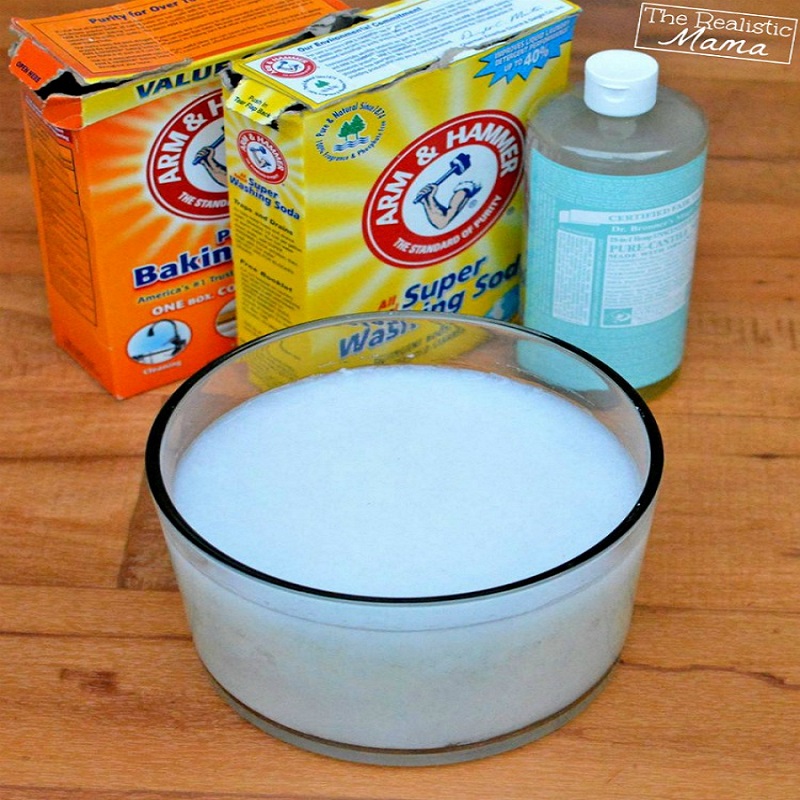
The Environmental and Health Benefits of DIY Detergent
Switching to homemade laundry detergent recipes offers numerous environmental and health advantages.
Less Environmental Impact
Homemade detergents significantly reduce plastic packaging waste compared to commercially produced products. By making detergent at home, you directly contribute to less production and disposal of plastic containers, which often end up in landfills and oceans.
Absence of Harsh Chemicals
Commercial laundry detergents often contain harmful chemicals like phosphates, dyes, and fragrances. These chemicals can irritate skin, trigger allergies, and pollute waterways. Homemade laundry detergents use safer, natural alternatives that are generally kinder to your skin and health.
Energy Conservation
Producing commercial detergents requires a significant amount of energy, largely from fossil fuels. By preparing your homemade laundry detergent, you are cutting down the energy used in manufacturing and long-distance transportation.
Cost-effective and Health-preserving
Homemade detergents are not only cheaper but also prevent exposure to endocrine disruptors and carcinogens often found in commercial products. This benefit is particularly important for households with young children or members with sensitive skin.
In summary, the benefits of using DIY laundry detergent extend beyond just personal health and cost savings. They contribute positively to the environment by minimizing pollution and waste. By opting for homemade detergent, you support a healthier, more sustainable lifestyle.
Ingredients To Use for Homemade Laundry Detergent
Choosing the right ingredients is crucial when making homemade laundry detergent. These ingredients should clean effectively while being safe for the environment and your family’s health.
Safe and Effective Ingredients
Here’s a list of safe and commonly used ingredients in DIY laundry detergents:
- Washing Soda: A natural mineral that cuts through stains and softens water.
- Baking Soda: Eliminates odors and gently cleans garments.
- Borax: Enhances the cleaning power of the detergent and helps in stain removal.
- Bar Soap: Choose a natural, unscented soap to avoid chemicals.
- Essential Oils: Add your favorite scents naturally and boost cleaning.
Importance of Ingredient Selection
The quality of your ingredients will determine the effectiveness of your detergent. Non-toxic and biodegradable ingredients ensure that your DIY detergent is eco-friendly.
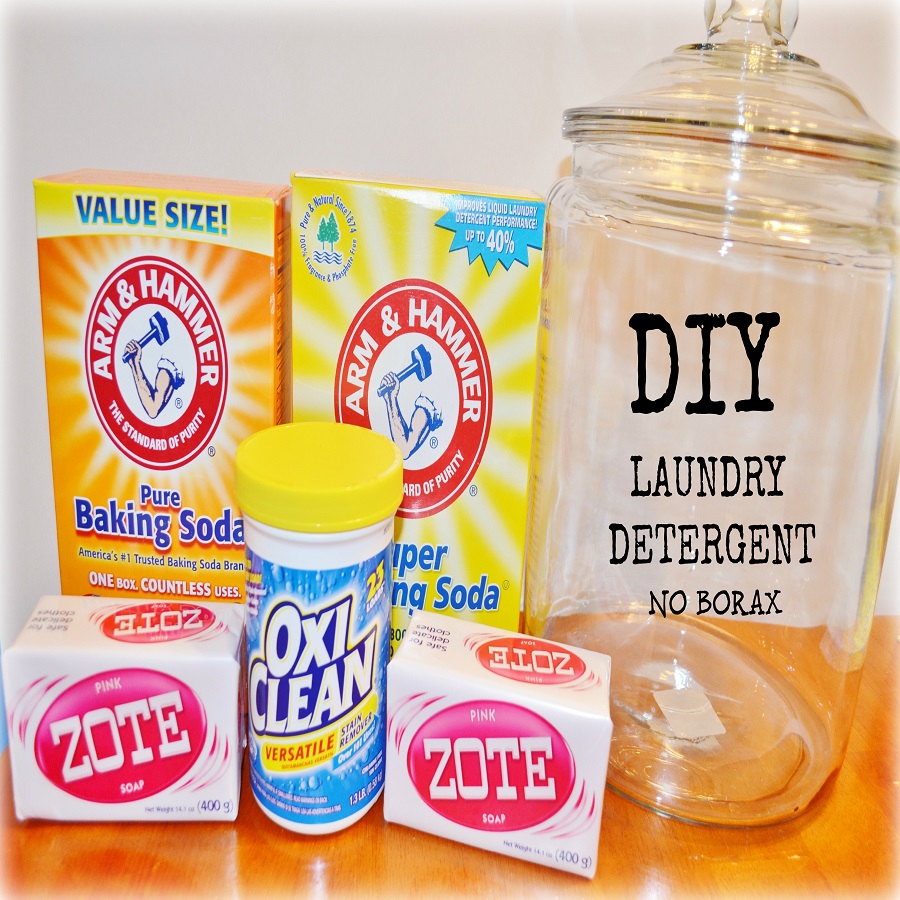
Ingredient Measures
- Use 1 part of each ingredient for a balanced mix.
- Adjust amounts based on laundry load sizes and soil levels.
By carefully selecting and combining these ingredients, you can create a powerful homemade laundry detergent that is both gentle on clothes and kind to the planet.
Step-by-Step Guide to Making Your Own Laundry Detergent
Creating your own laundry detergent is easy and can be done in just a few simple steps. Here’s the guide to making your own effective, eco-friendly laundry detergent:
- Gather your ingredients, including washing soda, baking soda, borax, bar soap, and essential oils if you desire a fragrance.
- Grate the bar soap using a cheese grater until you get fine shavings. This helps it blend easily with other powdered ingredients.
- In a large bowl or container, mix together one part of each: washing soda, baking soda, and borax. The ratio should be equal unless adjusting for heavy soil or hard water.
- Add the grated bar soap to the mixture and stir thoroughly to ensure an even distribution.
- For a pleasant scent, add a few drops of your chosen essential oils and stir again.
- Store your homemade laundry detergent in an airtight container to keep moisture out and maintain effectiveness.
- Use 1-2 tablespoons of the detergent per load, adjusting as needed based on the size of the load and how dirty the clothing is.
This simple recipe yields an effective laundry detergent that’s both kind to your wallet and the environment. Not only will it reduce the chemicals in your home, but it will also cut down on plastic waste, benefiting the planet as a whole.
Tips for Effectively Using Homemade Laundry Detergent
When using homemade laundry detergent, it’s essential to use it correctly for the best results. Here are some practical tips to ensure your clothes come out clean and fresh:
Measure Accurately
Always measure your detergent. Use 1-2 tablespoons per load. For bigger or dirtier clothes, add a little more.
Dissolve Properly
To avoid residue, dissolve the detergent in water before adding clothes, especially in cold water.
Pre-Treat Stains
Apply detergent directly to stains before washing for better stain removal.
Sort Laundry
Separate whites and colors. This prevents colors from bleeding onto whites.
Adjust for Hard Water
You might need more detergent if you have hard water. It makes the detergent work harder.
Use Vinegar as a Fabric Softener
Add white vinegar to the rinse cycle. It’s natural and helps remove any leftover soap.
Clean Your Washing Machine
Regularly clean your washer. This helps homemade detergent work better and keeps your machine in top condition.
Hot vs. Cold Water
Hot water works better for heavy soil. But, cold water is fine for most laundry and saves energy.
Don’t Overload
Avoid overloading the washing machine. Clothes need room to move for the detergent to work well.
Store Detergent Properly
Keep your homemade detergent dry. Store it in an airtight container, away from moisture.
Following these tips can help you make the most of your homemade laundry detergent, keeping your clothes clean while saving money and protecting the environment.
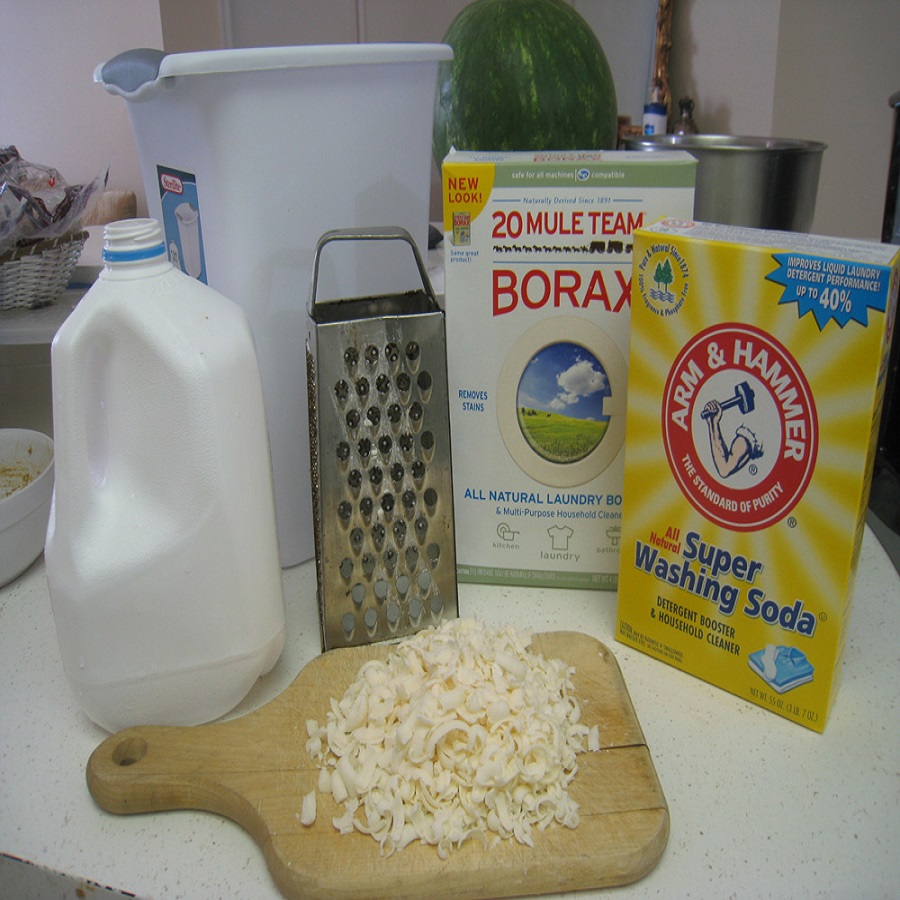
Troubleshooting Common Homemade Detergent Concerns
While homemade laundry detergent offers numerous benefits, you might face certain issues. Here are ways to troubleshoot common concerns:
Detergent Not Dissolving Properly
If your detergent isn’t dissolving well, especially in cold water, try these tips:
- Dissolve the detergent in warm water before adding it to the wash.
- Make sure to grate your bar soap very finely during the making process.
Residue Left on Clothes
To avoid residue on your washed clothes, consider these adjustments:
- Use less detergent per load.
- Double-check that you are not overloading your washing machine.
Inadequate Cleaning Performance
If clothes aren’t coming out as clean as expected, enhance your detergent’s effectiveness:
- Increase the amount slightly for larger or dirtier loads.
- Consider adding a pre-treatment step for tough stains.
Detergent Clumps
Detergent clumping can be frustrating. Here is how to deal with it:
- Store your detergent in a dry, airtight container.
- Add a few rice grains or silica packets in the storage container to absorb moisture.
Mildew Smell from Clothes
A mildew smell suggests issues with dissolving or rinsing:
- Run an extra rinse cycle.
- Use a few drops of tea tree oil in your detergent mix for its natural antibacterial properties.
These solutions should help you address common issues faced with homemade laundry detergent, making your DIY cleaning experience smoother and more effective.
Additional Natural Laundry Care Tips
In addition to making your own laundry detergent, here are some extra tips to enhance your natural laundry routine:
- Line Dry When Possible: Save energy and give your clothes a fresh scent by drying them outside on a clothesline.
- Stain Removal: For spot treatment, create a paste with baking soda and water and apply directly to stains before washing.
- Whiten Naturally: Brighten whites by adding a half cup of lemon juice or distilled white vinegar to the wash cycle.
- Reusable Dryer Sheets: Instead of single-use dryer sheets, try wool dryer balls. They soften clothes and can be scented with a few drops of essential oils.
- Laundry Boosters: Increase cleaning power for heavily soiled items by adding half a cup of hydrogen peroxide or baking soda to the load.
- Eco-Friendly Bleach Alternative: Mix water and hydrogen peroxide in a 2:1 ratio as a natural bleach alternative that’s safe for colors.
- Wash Full Loads: Maximize water and energy efficiency by washing full loads, but don’t overload.
- Cold Water Wash: Lower energy consumption by using cold water for most washing cycles.
These tips help you maintain an eco-friendly approach to laundry, reduce costs, and ensure clothes stay clean and fresh.
FAQ: All You Need to Know About Homemade Laundry Detergent
Homemade laundry detergent recipes often raise questions about their effectiveness, use, and storage. Here are some frequently asked questions answered concisely to help you better understand homemade laundry detergents.
Is Homemade Laundry Detergent as Effective as Store-Bought?
Yes, when made with the right ingredients, homemade laundry detergents can be just as effective, if not better, for certain types of laundry.
Can I Use Homemade Detergent in Any Washer?
Homemade detergent is suitable for standard, high-efficiency, and front-loading washers. It’s low-sudsing and safe for all types.
How Much Homemade Detergent Should I Use Per Load?
Typically, 1-2 tablespoons are sufficient for a regular load. Adjust based on the load size and soil level.
Will Homemade Detergent Work in Hard Water?
Homemade detergents may require a slight adjustment, like adding a bit more, to work in hard water.
Can I Add Fragrance to My Homemade Detergent?
Essential oils can be added for a natural fragrance. Choose oils that are safe and enjoy the scent.
Does Homemade Laundry Detergent Have a Shelf Life?
If stored properly in a dry, airtight container, it can last up to a year.
Why Does My Homemade Detergent Clump Up?
Moisture can cause clumping. Ensure your storage container is completely dry and airtight.
Is Homemade Laundry Detergent Safe for Sensitive Skin?
Generally, yes. Homemade detergents often omit skin-irritating ingredients found in commercial products.
How Can I Improve the Cleaning Power?
For heavy soil, add more detergent or include a booster like baking soda or hydrogen peroxide.
Will My Clothes Smell Like Commercial Detergent?
Homemade detergent typically leaves clothes smelling clean and fresh but without the strong fragrances of commercial products.
